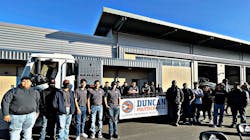A couple of recent news items about electric vehicles caught my eye. Neither of them had to do with the production of the trucks or infrastructure developments. Rather, they focused on EV servicing.
The first was an announcement by Mack that the Fresno United School District had purchased a Mack LR electric refuse truck to use in its technician training program.
"The current students and potential technicians of the future are being exposed and trained on the newest technology entering our marketplace long before most current technicians in the industry will have the opportunity to work on these vehicles," said Kim Mesfin, president of Affinity Truck Center, the dealership that sold the truck to the school. "It is preparing our industry in advance rather than in arrears."
See also: Old and New School ways needed for tech recruiting, training
I very much like the phrase, "preparing our industry in advance rather than in arrears."
The reality is we cannot wait for the full-scale rollout of electric vehicles to begin tackling the service issues that will be associated with those vehicles. We need to start today to introduce technicians to the difference between servicing EVs and diesel-powered trucks. We all know EVs will still have tires, brakes, HVAC systems, suspension components, driveline components, safety systems, and more.
All of those items will likely be serviced the same as they are today, but there may be servicing issues we will not discover until more of these trucks are on the road. There are also things like camera systems, onboard computers, ELDs, and the bodies and chassis themselves that will need maintenance. Some genuine differences will need to be addressed, some of which revolve around safely servicing the vehicle.
Creating standards for EV technicians
The second announcement was from the National Institute for Automotive Service Excellence (ASE) and was about creating Electric Vehicle Technician/Shop Personnel Electric Safety Standards.
ASE stated: "Certifications were developed to serve as a guide, sharing existing industry standards, concepts, and practices followed by individuals working in the automotive, truck, and commercial electrical industry."
ASE has also developed a new testing and certification program for electric and hybrid vehicles.
These initiatives are steps in the right direction as we see more electric vehicles enter the market. To be clear, I am not saying that overnight the trucking industry will move from diesel power to electric. But so know that some portions of the industry are already moving to electric vehicles relatively quickly—especially fleets with trucks operating in California.
See also: Working together to ensure EV servicing safety
As more manufacturers ramp up EV production and more fleets start deploying them in large numbers, shops will need to be prepared to work on them. I was heartened to see that there are already initiatives underway to address the servicing of these new trucks.
I can't help but think that EVs may be a great way to attract the next generation of both drivers and technicians. The fact that EVs are "clean" is a big plus; the fact that they are "cool" might just be the boost we need to put the driver and technician shortages to bed.
Gino Fontana, CTP, is COO and EVP at Transervice Logistics Inc. Prior to this, he was VP of operations at Berkeley Division and Puerto Rico. He has more than 35 years of experience in the transportation and logistics industry with both operational and sales experience.
About the Author
Gino Fontana
Chief operating officer and executive vice president at Transervice Logistics Inc.
Gino Fontana, CTP, is COO and EVP at Transervice Logistics Inc. His operational expertise emphasizes cost savings, process efficiency and improvement, superior quality, and people management skills. He has more than 35 years of experience in the transportation and logistics industry with both operational and sales experience.
